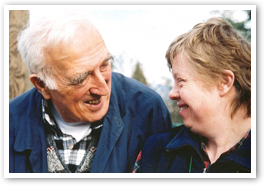Walking the walk of peace with Jean Vanier
- MARGARET SOMERVILLE
A personal tribute to the founder of the L'Arche communities.
 Jean Vanier, the founder of international L'Arche communities, has been awarded the 2015 Templeton Prize in recognition of his exceptional contribution to affirming life's spiritual dimension. MercatorNet asked Dr Margaret Somerville, Founding Director of the Centre for Medicine, Ethics and Law at McGill University, Montreal, to write an appreciation of a man who has dedicated much of his life to affirming the human dignity and qualities of people with intellectual disabilities, and to dialogue in the interests of peace.
Jean Vanier, the founder of international L'Arche communities, has been awarded the 2015 Templeton Prize in recognition of his exceptional contribution to affirming life's spiritual dimension. MercatorNet asked Dr Margaret Somerville, Founding Director of the Centre for Medicine, Ethics and Law at McGill University, Montreal, to write an appreciation of a man who has dedicated much of his life to affirming the human dignity and qualities of people with intellectual disabilities, and to dialogue in the interests of peace.

Over the past thirty-plus years, I have encountered Jean Vanier on many occasions, both in person at events where we were both speakers, and through his writing and reading and hearing what other people, for whom I have great respect, have to say about him. What I have found, without exception, by way of all of these different ways of coming to know Jean Vanier, is best summed up in what Dr. Balfour Mount (the eminent palliative care physician credited with bringing palliative medicine to North America) says about him:
"[S]ince first I heard him speak … I… have observed Jean Vanier's life of focused commitment and the healing impact of his presence. Jean is a man of towering intellect, global vision and impressive insight. His integrity is immediately evident on first meeting him, as are his gentleness and deep humility. To encounter Jean Vanier is to confront our human potential for thoughtfulness, compassion and sparkling joy in living."
Jean Vanier, son of distinguished Canadian parents, began his revolutionary work quietly in Northern France in 1964 when he invited two intellectually disabled men to come and live with him as friends. It soon grew and today there are 147 L'Arche (the name refers to both Noah's Ark, a refuge for people in pain, and an "arch" or bridge connecting heaven and earth) residential communities operating in 35 countries, and more than 1,500 Faith and Light support groups in 82 countries that similarly urge solidarity among people with and without disabilities. Vanier's Intercordia programme encourages university students in Canada and Europe to share in this experience..
In 2007, I was honoured with an invitation from Vanier's publisher to write a "blurb" for the dust cover of his book, a collection of his letters, entitled Our Life Together. Here's what I wrote:
As we move through Jean Vanier's letters to his and L'Arche's friends and supporters, increasingly he signs off with just "….. Love, Jean" — the most simple and profound salutation. This book is a love story of a different kind. It shows the extraordinary flourishing of the human spirit that can occur when a certain kind of love — a truly unselfish, non-self-centred love — is made central to ordinary daily life.
Jean Vanier's radical, counter-contemporary-culture message is that we "non-disabled" people are the losers in refusing to accept disabled people and rejecting the unique gifts they have to offer us as individuals and societies. He writes: "It's not a question of going out and doing good to them; rather receiving the gift of their presence transforms us". This unfashionable belief in the enormous value of what disabled people can contribute was summed up for me by a L'Arche assistant (a non-disabled person living in a L'Arche community) who said: "You have to understand, Margo, we're not martyrs, saints or heroes; we do this because of the fullness of life it brings us."
Vanier's letters gently show that among the many gifts disabled people can offer us are lessons in hope, optimism, kindness, empathy, compassion, generosity and hospitality, a sense of humour (balance), trust and courage. But, as he recognizes, to do that disabled people must be treated justly; given every person's right to the freedom to be themselves; and respected as members of our community. That requires us to accept the suffering, weakness and fragility we see in them, which means, as Vanier emphasizes, we must first accept those realities in relation to ourselves. Most of us find that an enormous challenge and flee.
That requires us to accept the suffering, weakness and fragility we see in them, which means, as Vanier emphasizes, we must first accept those realities in relation to ourselves. Most of us find that an enormous challenge and flee.
The ethical tone of a society is not set by how it treats its strongest, most powerful members, but by how it treats those who are weakest, most vulnerable and in need. Vanier has been an amazing example of this, displaying an uncommon "common humanity". Not everyone will share his Christian tradition, but everyone can learn from him how to enrich themselves, others and our world through developing, experiencing and celebrating the "gifts of the heart" and putting into practice a "little sign of love in the world," as he writes in Our Life Together.
In his acceptance speech at the prize giving in London last week, Vanier spoke first about the critical need for unity and peace today. In terms of achieving peace in our often tortured world, imagine what would happen if each and all of us put his approach into practice in relation to everyone we encountered, whether at an individual level, an institutional level, a societal level or a global level. Vanier doesn't just talk the talk of peace; he walks the walk of acceptance, love and peace, starting with how he treats everyone he encounters.
But his influence in generating peace, acceptance and love goes far beyond that in the waves that are set in motion by his example and the changed behavior of the vast number of people he inspires to try to emulate him in some way. He's a powerful example of an axiom one often hears in human rights advocacy, "one person can make a difference". Indeed, in the context of establishing acceptance, love and, as a result, peace, only one person, in the sense that each of us and all of us must be committed to promoting peace, can do so. Vanier assures us that we can be such, no matter how humble our circumstances or how poor or disabled or discriminated against we or those with whom we spend our lives might be.
Jean Vanier has been an inspiration to me personally, although I could never hope to live up to the example he sets. My work in ethics often brings me in touch with deeply wounded people and the challenge of trying to right the wrongs they suffer. In my opinion, each of us doing whatever we can to right wrongs, in a spirit of love and unconditional acceptance of those who are wronged and whom we try to help, as Jean Vanier has modelled for us, is a sine qua non of achieving a lasting peace, whether in an individual's life, the family, our institutions, societies and nations, or our world.

 This is Meaghen Gonzalez, Editor of CERC. I hope you appreciated this piece. We curate these articles especially for believers like you.
This is Meaghen Gonzalez, Editor of CERC. I hope you appreciated this piece. We curate these articles especially for believers like you.
Please show your appreciation by making a $3 donation. CERC is entirely reader supported.

Acknowledgement
 Margaret Somerville. "Walking the walk of peace with Jean Vanier." Mercatornet (March 19, 2015).
Margaret Somerville. "Walking the walk of peace with Jean Vanier." Mercatornet (March 19, 2015).
Reprinted with permission of Mercatornet. Photo: Catholic Ireland.
The Author
 Margaret Somerville is Professor of Bioethics in the School of Medicine at the University of Notre Dame Australia. Until recently, she was Samuel Gale Professor of Law, Professor in the Faculty of Medicine, and Founding Director of the Centre for Medicine, Ethics and Law at McGill University, Montreal. She is the author of Bird on an Ethics Wire, The Ethical Imagination: CBC Massey Lectures, Death Talk: The Case Against Euthanasia and Physician-Assisted Suicide, The Ethical Canary: Science, Society, and the Human Spirit, and Do We Care?.
Margaret Somerville is Professor of Bioethics in the School of Medicine at the University of Notre Dame Australia. Until recently, she was Samuel Gale Professor of Law, Professor in the Faculty of Medicine, and Founding Director of the Centre for Medicine, Ethics and Law at McGill University, Montreal. She is the author of Bird on an Ethics Wire, The Ethical Imagination: CBC Massey Lectures, Death Talk: The Case Against Euthanasia and Physician-Assisted Suicide, The Ethical Canary: Science, Society, and the Human Spirit, and Do We Care?.




